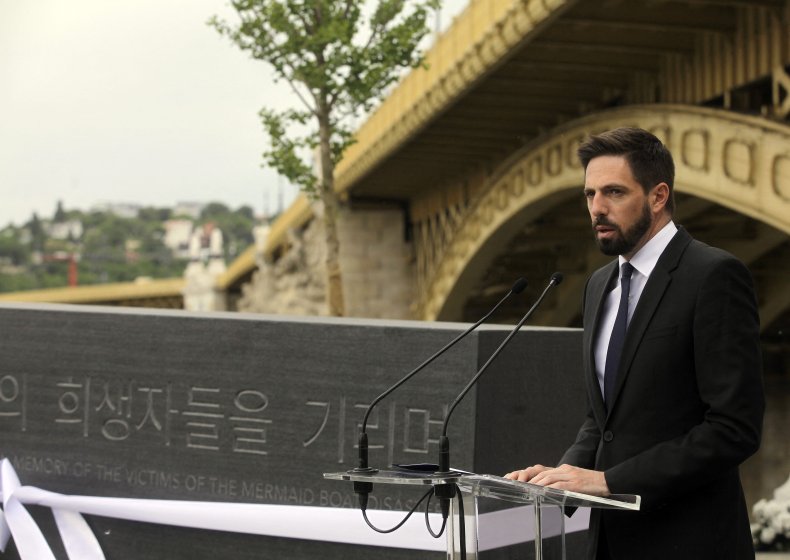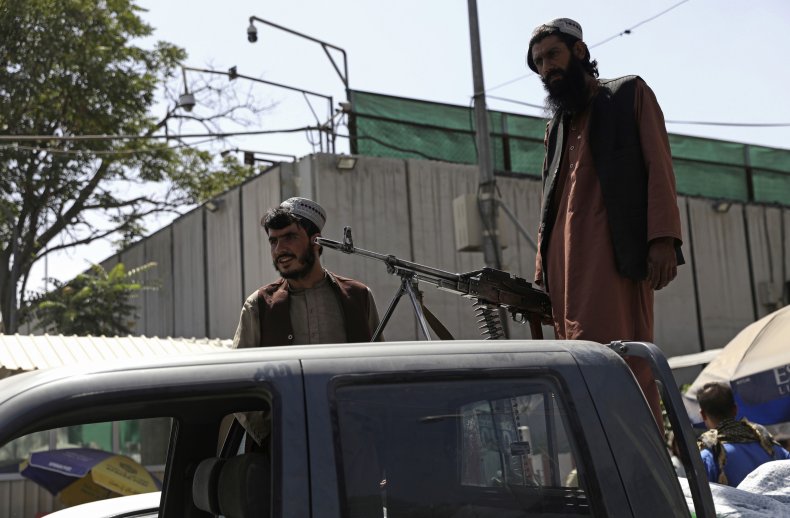Hungary to Refuse Afghan Refugees, Won't Make Citizens Pay for U.S.' 'Flawed' Decisions
Hungarian's right-wing government will not make its citizens pay for the U.S.' "flawed geopolitical decision" by allowing Afghan refugees into the country, the Associated Press reported.
Levente Magyar, a state secretary with Hungary's foreign ministry, told MTI that it would not be accepting refugees "without any kind of restrictions."
In 2015, Hungary built a fence along its southern border to prevent refugees from the Middle East and Africa from entering the country. Magyar said the fence would help drive away a potential wave of Afghan refugees, but they're willing to help those who worked as interpreters for Hungarian troops.
Over 60 countries signed a joint statement saying Afghans should be allowed to leave the country if they wished. In the European Union, only Hungary and Bulgaria did not sign the statement.
For more reporting from the Associated Press, see below.

U.N. refugee agency has "relatively positive" talks with Taliban
The head of the U.N. refugee agency says its recent interaction with the Taliban—Afghanistan's new rulers—has been "relatively positive" and that humanitarian aid teams will stay in the country to help people in need after the Kabul government was toppled.
Filippo Grandi, the United Nations' High Commissioner for Refugees, said UNHCR discussions with the Taliban "may at times be difficult."
In an interview at UNHCR headquarters in Geneva, Grandi said the agency would continue to press for respect of the rights of women and girls, who had faced strict rules and bans on school education, for example, when the Taliban previously ran the country—before a U.S.-led international coalition drove them from power in 2001.
Grandi noted that most of the displacement in recent weeks has been within Afghanistan, but appealed to other countries to keep their borders open and take in any refugees who could flee in the future. He said a half-million people have been internally displaced this year, the "vast majority" of which in the last few weeks alone.
He said that while UNHCR and partners have been previously in contact with Taliban leaders in rural areas before its forces swept into cities in recent weeks. Most of the recent interaction has been on issues like security and safety of the sites of UNHCR and partners
U.N. calls for immediate end to violence in Afghanistan
The United Nations chief is calling for an immediate end to violence in Afghanistan and urging the international community to unite to ensure that the human rights of all people, especially women and girls, are respected.
Secretary-General Antonio Guterres appealed to the U.N. Security Council at an emergency meeting on Monday "and the international community as a whole to stand together, work together and act together."
He said he is "particularly concerned by accounts of mounting human rights violations against the women and girls of Afghanistan who fear a return to the darkest days" in the 1990s when the Taliban ruled and barred girls for getting an education and imposed draconian measures on women.
Guterres said "the world is following events in Afghanistan with a heavy heart and deep disquiet about what lies ahead" and with the country's future and the hopes and dreams of a generation of young Afghans in the balance, the coming days "will be pivotal."
At this "grave hour," the secretary-general urged all parties, especially the Taliban, "to exercise utmost restraint to protect lives and to ensure that humanitarian needs can be met."
Guterres said the U.N continues to have staff and offices in areas now under Taliban control, and which so far have been respected. "Above all, we will stay and deliver in support of the Afghan people in their hour of need."
"We cannot and must not abandon the people of Afghanistan," he said.
Taliban enters TOLO-TV compound, looking for government-issued weapons
The Taliban entered Afghanistan's most popular TOLO-TV compound in the capital on Monday, "looking for government-issued weapons," said the station's owner, Saad Mohsini.
"They sent a bunch of people just to look at the security to check the weapons....They are collecting government-issued weapons and other assets, they let us keep our own weapons," he said.
"They were polite." Mohsini said, adding that the insurgents offered to keep a watch outside and even offered to provide security inside the compound. Mohsini said the station declined.
There was no mention of the many women who work for TOLO TV.
The TV staff were told to continue with their transmissions. "No mention of the women reporters," Mohsini said. "They just said keep your transmissions, normal programming going."


